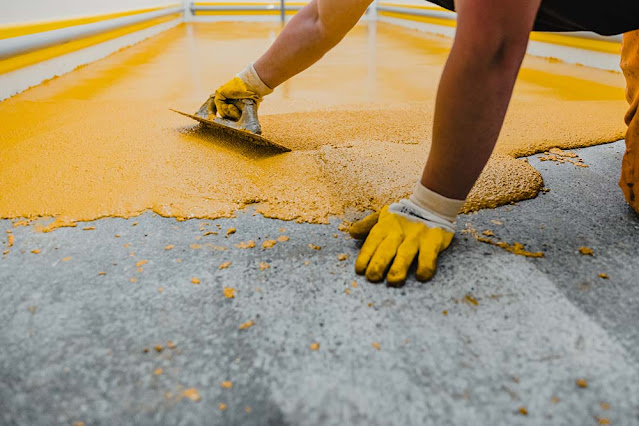THE BEST CHOICE FOR CONCRETE FLOOR COATING. EPOXY VS. POLYUREA:
When it comes to coating concrete floors, two popular options that often come up in discussions are epoxy and polyurea. Both epoxy and polyurea coatings offer durable and attractive finishes that protect concrete surfaces from wear and tear. However, there are distinct differences between the two in terms of application, performance, and maintenance. In this article, we will compare epoxy and polyurea coatings to help you make an informed decision on the best choice for your concrete floor coating needs.
Epoxy Coatings:
Epoxy coatings are made from a combination of epoxy resin and a hardening agent. They have been widely used for many years and are known for their exceptional durability and resistance to chemicals, stains, and impacts. Here are some key characteristics of epoxy coatings:
Application Process:
Epoxy coatings require careful surface preparation before application. The concrete surface needs to be thoroughly cleaned, repaired, and free of any contaminants. Once the surface is ready, the epoxy coating is typically applied in multiple layers, including a primer, base coat, and topcoat. The curing time between each layer is essential to ensure proper adhesion and strength.
Durability and Performance:
Epoxy coatings are renowned for their durability and long-lasting performance. They create a strong, seamless, and resistant surface that can withstand heavy foot traffic, vehicle traffic, and chemicals. Epoxy coatings also have excellent resistance to impact and abrasion, making them suitable for industrial and commercial settings.
Aesthetics:
Epoxy coatings are available in a wide range of colours and finishes, including solid colours, metallic effects, and decorative patterns. They provide a glossy, smooth surface that enhances the overall appearance of the floor. Epoxy coatings can also be customized with additives like flakes or quartz to create a unique and visually appealing design.
Maintenance:
Maintaining an epoxy-coated floor is relatively easy. The smooth and seamless surface prevents dirt, dust, and spills from penetrating the coating, making it simple to clean with regular sweeping and mopping. Epoxy coatings are also resistant to chemicals, making them suitable for environments that require frequent cleaning.
Polyurea Coatings:
Polyurea coatings are a newer technology that has gained popularity in recent years. They are formed by a chemical reaction between an isocyanate component and a resin blend. Polyurea coatings offer several distinct advantages:
Application Process:
Polyurea coatings are known for their fast curing time, allowing for quick installation. They can be applied in a single coat, which significantly reduces the installation time compared to epoxy coatings. The quick curing time also means that the floor can be ready for use within a short period.
Durability and Performance:
Polyurea coatings excel in terms of durability and performance. They have superior resistance to abrasion, impact, chemicals, and UV rays. Polyurea coatings are highly flexible, which allows them to withstand substrate movement without cracking or peeling. This makes them an excellent choice for outdoor applications or areas where temperature fluctuations are common.
Aesthetics:
Polyurea coatings offer a range of color options and finishes. While they may not provide the same high-gloss finish as epoxy coatings, they can still achieve a smooth and visually appealing surface. Polyurea coatings can be customized with additives and decorative elements for added aesthetics.
Maintenance:
Similar to epoxy coatings, polyurea coatings are easy to maintain. The seamless and non-porous surface resists stains, chemicals, and dirt, making it simple to clean with regular sweeping and mopping. Polyurea coatings are also resistant to yellowing, ensuring that the floor maintains its original appearance over time.
Choosing the Best Option:
When deciding between epoxy and polyurea coatings for your concrete floor, consider the specific needs and requirements of your project. Here are some factors to consider:
Timing and Installation:
If time is a critical factor and you need a quick installation, polyurea coatings may be the better choice due to their fast curing time. Epoxy coatings, while more time-consuming during installation, offer a more traditional and proven method.
Durability and Performance:
Both epoxy and polyurea coatings provide excellent durability and performance. However, polyurea coatings offer superior flexibility and resistance to substrate movement, making them ideal for areas where temperature changes or substrate shifting is expected.
Aesthetics:
Consider the desired appearance of your floor. Epoxy coatings offer a high-gloss, smooth finish and a wide range of design options. Polyurea coatings, on the other hand, may provide a slightly less glossy finish but offer quick installation and good aesthetic appeal.
Budget:
Budget considerations are essential for any project. Epoxy coatings tend to be more cost-effective, especially for larger floor areas. Polyurea coatings may have a higher initial cost due to their advanced technology and quick curing time.
In summary, both epoxy and polyurea coatings offer durable and attractive solutions for concrete floor coatings. Epoxy coatings are known for their exceptional durability, glossy appearance, and customization options. Polyurea coatings provide fast curing times, superior flexibility, and excellent resistance to chemicals and UV rays. Consider your specific needs and project requirements to make an informed decision on the best choice for your concrete floor coating. Whether you opt for epoxy or polyurea, both options will enhance the durability, aesthetics, and longevity of your concrete floors.




Comments
Post a Comment